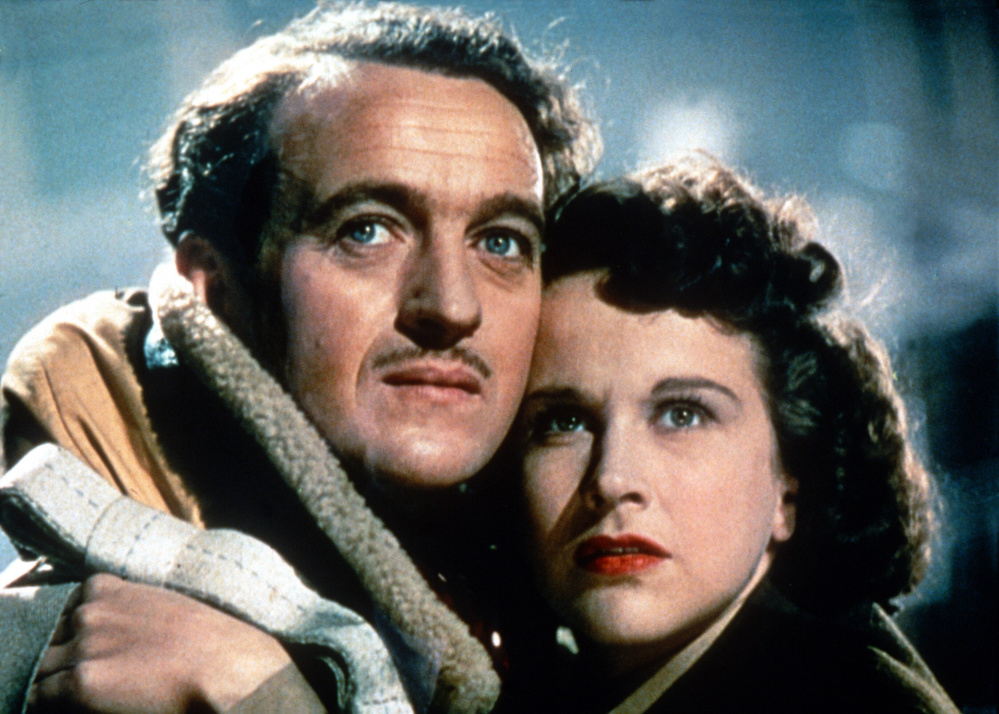This is what film festivals are about: going through the great cinematic attic, unpacking old trunks and pulling out fine old films, such as “Stairway to Heaven” (otherwise known as “A Matter of Life and Death”), and showing today’s jaded television viewers what British filmmakers were up to in the war years and the ’50s.
The legendary Michael Powell and Emeric Pressburger, often referred to as the most talented filmmakers of the ’40s and ’50s, did amazing things with their cameras.
I remember watching “Stairway” for the first time back in the ’60s, thinking it was simply a good British war movie with David Niven.
The first scene is inside a burning British bomber somewhere over England in the late ’40s. The pilot, Peter (Niven), is bloodied and battered, holding onto the corpse of his copilot and best friend.
The plane is obviously doomed, and while the fire is crackling around him, Peter is on the phone with June (Kim Hunter), an American woman working ground control.
Thinking it’s over for him and just happy to say his last words to a woman’s voice, Peter and June chat on, shouting over the snapping steel and glass.
“I love you, June,” Peter shouts. “You’re life, and I’m leaving it.”
She begs him to hold on. He tells her he has no chute, having given the last to his crew, and he’s just going to jump rather than burn to death, and out he goes.
This is where the film turns into some kind of a magical fantasy. Peter drops without a chute through the fog into the darkness. In the next scene, we see him on a beach, having washed ashore after miraculously falling into the sea.
By this time, we don’t know what we’ve got here, a war movie or a romantic fantasy. Peter shucks his gear and starts walking, eventually seeing a girl biking up toward him. It’s June.
We now have the choice of scoffing at the ridiculous coincidence, or joining Powell on his magical journey through time and space, linking human love and celestial game playing somewhere up in the universe. Stick with it. You’ve never seen anything like it.
Powell switches to black-and-white when he takes us to a “substation” on the way to heaven. There is a fantastic stairway out of the clouds into this immaculate space, where the combat dead of all nations (no bad guys allowed, of course) arrive to be assigned to their place in heaven.
Powell is not above great splashes of silly tongue-in-cheek moments, as when the dead are given sets of white wings encased in big, plastic, dry cleaner bags. And if I’m not mistaken, there seems to have been a Coca-Cola machine in the big room provided for the American deceased. Nice touch.
Peter’s deceased crew members are all here, watching a huge celestial clock while waiting for him. But Peter doesn’t show up.
Here is the rub.
Someone in the celestial record room has made a mistake. It seems that Peter was supposed to have stayed on the plane to die, but he didn’t, and now he’s alive on Technicolor Earth and in love. What to do?
A fantastic “Heavenly Conductor 71” (Marius Goring as a flirtatious French fop) is sent to bring him up to heaven for a trial, conducted by all manner of American and British actors, including Raymond Massey, not yet cast as Lincoln, as a prosecutor assigned to determine Peter’s fate.
On Earth we discover a brain operation being performed — on Peter? Is this all a drugged hallucination, or is it Powell telling us that, yes, love does conquer all, and that deep in the mysterious God’s heart, there is a soft touch for young lovers caught up in war? Your choice.
The effects throughout, in blazing Technicolor and gorgeous black-and-white, are worth the cost of the popcorn. Niven and Hunter are perfectly matched in that wonderful 1940s movie love way.
The film is not only a tribute to Powell and Pressburger, but to the talents of production designer Alfred Junge.
J.P. Devine, of Waterville, is a former stage and film actor.
Send questions/comments to the editors.



Comments are no longer available on this story